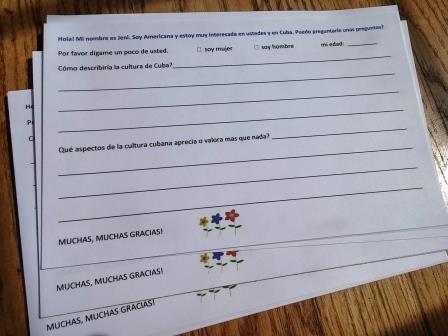
A picture forms in my mind, constructed by bits and pieces I’ve read and heard. I’m going to Cuba, a place that’s been shrouded in mystery and intrigue all of my lifetime. I consider this a baseline visit—a chance to see the country just as it begins to thaw from the long freeze out.
Wikipedia paints a picture in contrasts.
The average monthly wage as of July 2013 is 466 Cuban pesos which are worth about US$19.
Every Cuban household has a ration book entitling it to a monthly supply of food and other staples, which are provided at nominal cost.
Yet, there is this:
- Cuba is ranked very high for human development by the United Nations, and high for health and education.
- In 2015, it became the first country to eradicate mother-to-child transmission of HIV and syphilis, a milestone hailed by the WHO as “one of the greatest public health achievements possible.”
I review my travel packet one more time. Bring toilet paper, toilet seat covers, DEET bug spray. Don’t drink any water except from a sealed bottle. “U.S. cellphones will not have access to service in Cuba due to the embargo.”
An article in The New Yorker describes how Havana is being remade, now that the U.S. and Cuba have started to normalize relations. I want to see the former peanut-oil factory, La Fábrica de Arte Cubano, now a glitzy night spot that “hosts dancers, filmmakers, painters, photographers, and musicians.”
Regular tourism to Cuba is still prohibited to U.S. citizens unless you are traveling under certain “license categories.” My tour is in the “People-to-People” category. In the meticulously researched, Back Channel to Cuba: The Hidden History of Negotiations between Washington and Havana, I read that People-to-People was devised in the Clinton administration to advance “the economic and cultural magnetism of the U.S. and the promise of economic/political benefits which Cuba could gain from more rational behavior.”
The People-to-People program has been on and off over the years. I will be traveling with one of the few recently approved U.S. tour operators.
Tour documents say we will have “a full time schedule of educational exchange activities that will result in meaningful interactions between you and individuals in Cuba.”
We are told to keep a travel journal: “This journal will serve as proof that you have traveled to Cuba for educational purposes and should be kept for a period of five years as proof of the educational nature of your trip.”
At least two local community projects are on the agenda. “These organizations are in need of supplies and are willing to accept any gifts that you may wish to bring to them.” A long suggested list includes syringes, crayons, reading glasses, inhalers, and disposable razors.
I want to talk to the people we meet, but I don’t know the language. A wise Spanish-speaking friend helps me devise a short questionnaire people can answer in writing. She will translate when I get home.
The questions I hope pass muster:
- How would you describe the culture of Cuba?
- What aspects of Cuban culture do you and your family value the most?
I want to go back to Cuba in a few years to see what about the culture has been gained—or lost.
What are you curious to know about Cuba?

About the author:
Jenifer Joy Madden is a health journalist, digital media professor, tech hygienist, and inveterate parent of three durable young adults. Her words have informed millions on news outlets including ABC News, The Washington Post, and in her books, How To Be a Durable Human: Revive and Thrive in the Digital Age Through the Power of Self-Design and The Durable Human Manifesto: Practical Wisdom for Living and Parenting in the Digital World.
Download The Durable Human Manifesto for free here.
Learn more about this author on Google+.




I actually lived in Havana for 6 months in 1980, working for my country’s Embassy. Healthcare was already then very good. There were no illiterate Cubans over 7. People ate mostly black beans and rice. For an ordinary Cuban in Havana it was difficult to get sugar, fish, rum (these were exported), meat or produce. Most vegetables were canned, from East Germany. Ration cards gave one permission to buy a certain amount of food and clothing, but there never was enough. There was a constant shortage of everything, the usual answer in the stores was “No hay!”. No soap (yet people managed to be clean), no building materials, no paint, no …. you name it, they didn’t have it. The people I met were warm and friendly, scenery breathtakingly beautiful. I took several trips (by bus) to the beaches of Varadero and a couple of other places, and used local Havana bus system.
Adela
Thank you for sharing your experience, Adela. On my travels last week, I observed not much has changed in terms of the rationing of staples, although there are some new sustainable efforts to grow fresh food. I never had a chance to use local bus system, but it was obviously heavily used. The Cuban government clearly values both healthcare and education which provides a firm foundation for future improvements. I will write more in my next post.
So excited for you, Jeni! And so happy you have to keep a travel journal, because I want to know about EVERYTHING. You will be a lovely ambassador for a new era between our two countries! Safe travels, y un abrazote (a huge hug!)
Cuba (my country of origin) is a most beautiful country with largely clear blue skies, warm sunshine, palm trees galore, and unique architecture everywhere. Its people are full of passion for life, have a deep soul for music, and are creative and industrious. One of the gifts offered by the new, more open relationship forging between Cuba and the USA is that more Americans can share in Cuba’s beauty and its wonderful people! En-JOY (in joy). Looking forward to your findings and impressions!
Irene
Thanks for your heartfelt description, Irene!
is medical care available and adeguite??? thank you
This is what it says on Wikipedia: “Today, Cuba has universal health care and although shortages of medical supplies persist, there is no shortage of medical personnel. Primary care is available throughout the island and infant and maternal mortality rates compare favorably with those in developed nations.” Also, part of the cost of my people-to-people tour goes to “health insurance” to cover me.